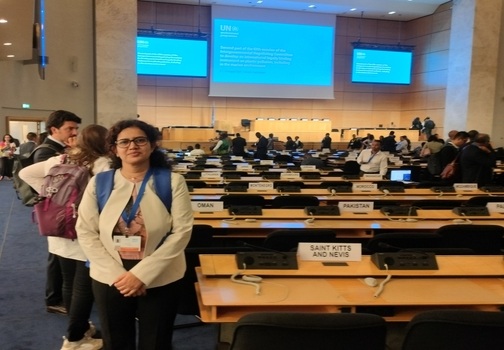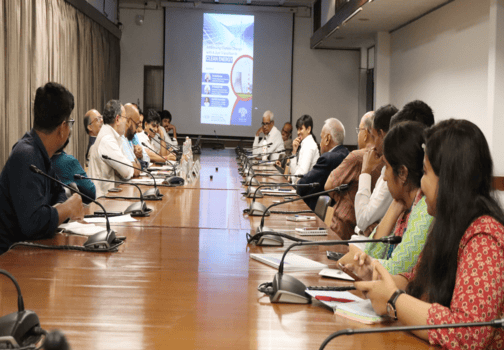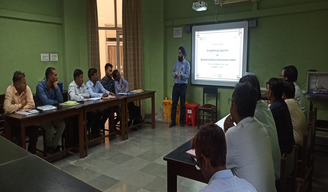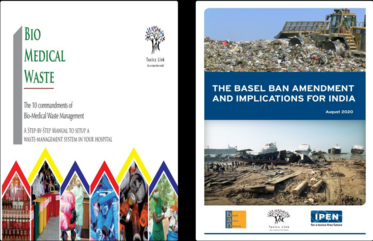Phasing out single use plastic
GOVERNMENT OF INDIA
MINISTRY OF ENVIRONMENT, FOREST AND CLIMATE CHANGE
RAJYA SABHA
UNSTARRED QUESTION No. 689
TO BE ANSWERED ON 26.07.2021
Phasing out single use plastic
689. SMT. KANTA KARDAM:
(a) whether Government has prepared an action plan to phase out the single use plastic by
2022 and presented an example by committing to end the pollution caused by plastic,
if so, the details thereof; and
(b) whether Government proposes to make all its offices free from single use plastic, if
so, the details thereof, and the directions issued to end the use of single use plastic like bottle in offices, in a phased manner?
ANSWER
MINISTER OF STATE IN THE MINISTRY OF ENVIRONMENT, FOREST AND CLIMATE CHANGE
(SHRI ASHWINI KUMAR CHOUBEY)
(a) The Plastic Waste Management Rules, 2016, prohibits manufacture, import, stocking,
distribution, sale and use of carry bags and plastic sheets less than fifty microns in thickness
in the country. There is complete ban on sachets using plastic material used for storing,
packing or selling gutkha, tobacco and pan masala.
The Ministry of Environment, Forest and Climate Change had also issued a draft
notification in the Gazette of India vide GSR No. 169 (E) on 11th March 2021 for amending
Plastic Waste Management Rules, 2016, inter alia prohibiting the use of identified single use
plastic items by 2022, for public consultation.
As per the draft notification, the manufacture, import, stocking, distribution, sale and use of
the following identified single use plastic items are proposed to be prohibited as per schedule
given below
- No. Items Phase out date
1 Carry bag made of virgin or recycled plastic less than120 microns
in thickness
30.09.2021
2 Non-woven plastic carry bag less than 60 GSM (Gram per square
meter) or 240 microns in thickness
30.09.2021
3 Ear buds with plastic sticks, plastic sticks for balloons, plastic flags,
candy sticks, ice-cream sticks, polystyrene [Thermocol] for
decoration
1.1.2022
4 single-use plastic (including polystyrene and expanded
polystyrene) items
Plates, cups, glasses, forks, spoons, knives, straw, container and
container lids, trays, plastic/PVC banners less than 100 microns,
stirrers.
01.07.2022
The above provisions shall not apply to commodities (including carry bags) made of
compostable plastic material.
The following steps have been taken to strengthen implementation of Plastic Waste
Management Rules, 2016 and also to reduce the use of identified single use plastic items:
(i) The States/UTs have been requested to constitute a Special Task Force under
Chairpersonship of Chief Secretary/Administrator for elimination of single use plastics and
effective implementation of Plastic Waste Management Rules, 2016. Already, 14 States/UTs
have constituted the Special Task Force till date. A National Level Taskforce has also been
constituted by the Ministry for taking coordinated efforts to eliminate identified single use
plastic items and effective implementation of Plastic Waste Management Rules, 2016.
(ii) The State /UT Governments and concerned Central Ministries/Departments have also
been requested for the development of a comprehensive action plan for elimination of single
use plastics and effective implementation of Plastic Waste Management Rules, 2016, and its
implementation in a time bound manner.
(iii) Directions under Section 5 of Environment (Protection) Act, 1986, have been issued
to all States/Union Territoriesinter alia for setting up for institutional mechanism for
strengthening enforcement of Plastic Waste Management (PWM) Rules, 2016.
(iv) The Government has been taking measures for awareness generation towards elimination
of single use plastics and effective implementation of Plastic Waste Management Rules,
2016.
(b) The Ministry had also issued “Standard guidelines for Single-Use Plastic” on 21st
January 2019 to all States/UTs and Ministries. The Standard guidelines entail waste
management system improvements, legal options for States/UTs to prohibit SUP items
through regulatory measures, eco-friendly alternatives, social awareness and public
education. The guidelines also include measures to be taken by government offices including
to discourage the use of plastic waste bottles.






